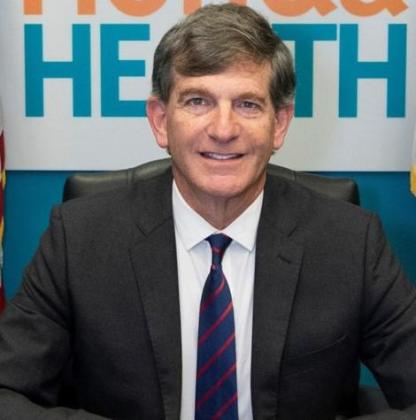News Service of Florida
Former Florida Surgeon General Scott Rivkees appeared on the “Deeper Dive” podcast produced by the News Service of Florida with NSF host Dara Kam. He discussed his time as Florida's top doctor, which overlapped the start of the COVID-19 pandemic in March 2020, and the state of public health
Rivkees, now a Professor of Practice at Brown University School of Public Health, is a longtime pediatrician interested in public health issues.
“I very much enjoyed my time in Florida and the work we did at the Department of Health making it the best in the country, and how we battled COVID,” he said.
Rivkees recalled how COVID was initially difficult to contain because many people were asymptomatic for the first days of having it.
“It spread differently than flu. There was the period before people became sick, with flu you're not contagious until you spread symptoms,” he said. “It was difficult to find out how we were going to contain the virus and respond to it. The other major thing we learned is how important it is to have a coordinated national response to COVID so that we all have an idea of the best way to respond to a new pandemic.”
Differing voices across the country led to a second pandemic during COVID — one of misinformation discrediting medical experts, Rivkees said.
“Some individuals were denying the role of public health and addressing other regulations that can protect the public,” he said. “It’s important for individuals who have the facts to give the message to keep all of us safe. I’m talking medically substantiated facts. We’re in such a polarized climate that we’ve eroded the trust in the expert.
“Long ago there was a wrong notion that the measles vaccine was associated with autism, there was no medical evidence. We’ve started to see rates of vaccination begin to decrease. During the pandemic, there was a lot of information about how vaccines aren’t safe or effective. We’ve actually seen that spread, reports published in medical journals that show routine pediatric vaccination for many vaccines has actually decreased in some parts of the country. In the past six months we’ve seen outbreaks of measles. So, this is real.”
A concern of his now is the state of mental health of school-aged children in the wake of the pandemic.
“The data on this subject (from 2021) showed many cases of student helplessness and poor mental health; 22% of high school students have seriously considered attempting suicide,” he said. “This tells us we’re in special times, where children really need help, and we need to take conflict out of their lives. There is a massive shortage of teachers in Florida and the United States. If we lose those connections to students, this is going to have an impact.
“We need to realize how students get information today. Far fewer students read than before, and they spend hours a day on social media, the U.S. Surgeon General issued an advisory on the impact it has on children; he didn’t issue an advisory about whether they read books.
Data is clear about the stress kids are under now, Rivkees said.
“Surveys have questions about different types of activity, people should like to understand what’s happening to children who experience persistent feeling of sadness or hopelessness,” he said. “This helps us understand the issues we need to focus on.”
On changes to the practice of medicine in the wake of COVID-19: “We’ve seen delayed health care, people afraid to go out, so we’ve seen excess mortality and other medical conditions. The second is the loss of confidence in the medical expert. If you can’t trust your doctor to give you information about practices, what are you going to do when you get cancer, who will you answer for that? Third, legislation that will put handcuffs of public health and keeping the public safe. If you take away that ability to help individuals to medical conditions and basic health measures like vaccination, we’ll all be more vulnerable in the future.”
On top concerns about the practice of medicine right now: “We have to restore trust in medicine. A patient needs to know, when they're sick, the advice they can follow is accurate, fact-based information. We need to get back to trusting our doctors and medical professionals.
On the best advice for patients seeking care: "Health care is local, so if you’re looking for someone, speak to your neighbors and family. It’s a safe relationship between you and your doctor."




